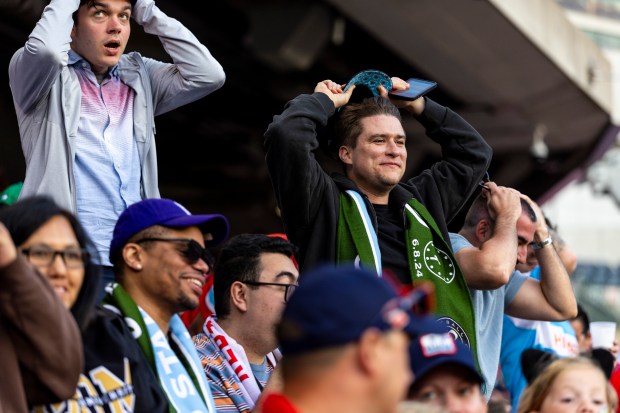SPRINGFIELD — Chicago Mayor Brandon Johnson met with Gov. J.B. Pritzker and state lawmakers on Wednesday to make his pitch for more state funding for critical city operations such as the public schools, and to discuss the Chicago Bears’ $3.2 billion domed stadium proposal.
Johnson is backing the Bears’ proposal, while Pritzker has labeled it a “nonstarter” in large part because of its large public funding component. Meeting with reporters late Wednesday afternoon, Johnson said conversations are ongoing but stressed the need to replace Soldier Field.
“You have a 100-year-old building that is millions of dollars in debt. And so you have this asset that is not getting the full benefit for the people of the state of Illinois,” he said. “And as the Bears continue to have these conversations with leadership, as well as the rank-and-file members, that’s the case that they will have to make, but understanding that we have a structural, damaged situation that really needs a solution.”
Johnson’s budget requests at the Illinois State Capitol came on the same day a state Senate committee approved legislation opposed by the mayor’s key ally, the Chicago Teachers Union, that would extend a school closure moratorium for all of the city’s public schools by two years. The CTU has labeled the measure, initially drawn up to protect selective-enrollment schools, as “racist,” as the union presses to invest more money in neighborhood schools.
“We want an equitable school district that speaks to the needs of the people of the city of Chicago,” Johnson said when asked about the bill. “And as these amendments continue to be assessed, we’re going to create more space for these conversations so that we ultimately get to the goal that we want, which is an equitable school district.”
Johnson previously has said his Springfield wish list includes $1 billion in state funding that’s “owed” to the “families of Chicago.” That money would include greater state aid under the evidence-based funding formula and additional teacher pension funds.
“We have to continue to make sure that the state of Illinois is doing right by the economic engine of the state of Illinois, which is the city of Chicago,” Johnson told reporters. “But it’s also to continue to build relationships of the opportunity that we have in this moment as a state to really build the type of operation that speaks to equity and justice.”
Johnson’s request for additional funding for Chicago Public Schools could be a tall order, as Pritzker has over the last few years increased state funding for elementary and high schools only by minimum target of $350 million annually set in a 2017 education funding compromise under his predecessor, Republican Gov. Bruce Rauner.
Advocates have warned that those increases are not enough to meet the state’s goals of adequately funding public schools in Chicago and other parts of the state.
Pritzker also has indicated that belt-tightening is needed to secure his $52.7 billion budget proposal, which is now negotiated by state lawmakers ahead of a scheduled May 24 adjournment.
There was no full accounting of specifics disclosed by city or state officials on what the progressive mayor discussed at Wednesday’s meetings. But a meeting with progressive Democratic lawmakers involved some “less high-profile budget needs,” such as lead service pipe replacement, according to state Rep. Kelly Cassidy, a Chicago Democrat.
She said school funding and the Bears’ stadium plan came up. But the meeting was brief and specifics were few, Cassidy said.
Johnson arrived at the Capitol early Wednesday afternoon. He met separately with Pritzker, the two top leaders of the Democrats’ legislative supermajority, House Speaker Emanuel “Chris” Welch of Hillside and Senate President Don Harmon of Oat Park, and various lawmakers. At one point, a reporter asked Johnson how the sessions were going.
“Well, you know, it’s Springfield,” he said, before walking up to the third floor of the Capitol.
Funding for Chicago’s public transportation apparatus could also be on Johnson’s Springfield agenda. Lawmakers are weighing a sweeping set of recommendations about what Chicago-area transit could look like in the future, including whether the CTA should be consolidated with Metra and Pace into one agency and how to address a transit fiscal cliff expected when federal pandemic aid runs out.
But Pritzker and Johnson differ on who should be leading the charge. The governor has indicated in recent weeks that the CTA is due for an “evolution of the leadership,” comments that were directed toward CTA President Dorval Carter, who has come under fire by critics for the transit agency’s shortcomings. Johnson has not said whether Carter should be removed from his post.
Separately Wednesday, members of the Chicago City Council’s aldermanic Black Caucus were in Springfield on Wednesday to talk to Welch about ward-level priorities, including education and neighborhood improvement issues.
Ald. Jeanette Taylor, of the South Side’s 20th Ward, said she supports extending the moratorium on school closings, and that there is a need to “invest in alternative schools.”
But she also cited the need for nuts and bolts infrastructure improvements.
“I could never in my tenure get all of my streets and sidewalks done, and so I need to be able to ask those state (elected officials), senators and my Cook County commissioners, because that’s the next stop. … ‘Hey, how are we working together to make sure that every community looks good?’” Taylor said.
Tribune reporter Olivia Olander contributed.





